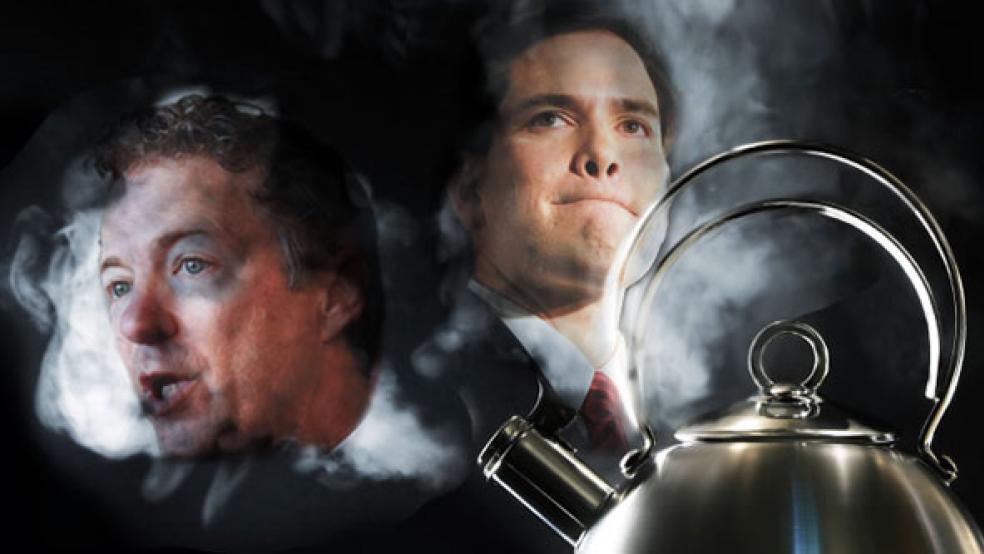Two years ago, the fledgling Tea Party rocked the political landscape by helping Republicans regain control of the House and putting the party on a collision course with President Obama and the Democrats over budget and tax policy. Tea Party House members put enormous heat on House Speaker John Boehner, R-Ohio, to take a hard line in his dealings with the White House and congressional Democrats over key fiscal issues, and they nearly forced a government shutdown and the first default on U.S. debt in history.

Now, in the wake of stunning primary victories over GOP establishment figures in Indiana, Nebraska and Texas and a favorable showing in Tuesday’s primary in Missouri, Tea Party strategists are setting their sights on establishing a major beachhead in the Senate next January.
RELATED: Tea Party Says as Debt Rises, So Does Membership
Combined with at least a half dozen current senators with strong Tea Party ties – including Rand Paul of Kentucky, Pat Toomey of Pennsylvania, Mike Lee of Utah and Ron Johnson of Wisconsin – these newcomers could put great pressure on GOP Senate Minority Leader Mitch McConnell of Kentucky to advance their agenda of a balanced budget, smaller government, entitlement and tax reform, and repeal of Obama’s health care reforms.
This would be especially true if the Republicans manage to win control of the Senate while retaining control of the House in November. The Senate is currently composed of 51 Democrats, 47 Republicans, and two independents who caucus with the Democrats. Democrats must defend 23 of 33 seats on the ballot, and roughly ten of those contests are considered too close to call.
“If these Tea Party candidates get through to the Senate . . . my guess is that the center of power is going to move toward that ‘Freedom Caucus’ and away from the establishment Republicans,” said David Kirby, a vice president at FreedomWorks, a Tea Party affiliated group, and an associate policy analyst for the libertarian Cato Institute. “And it’s going to be that caucus that’s going to be driving the energy for pretty much the whole legislative body.”
Until last night, things have gone remarkably well for the Tea Party. In the all important Texas Republican primary race to succeed retiring Sen. Kay Bailey Hutchison (R), former state solicitor general Ted Cruz easily defeated Lt. Gov. David Dewhurst in a July 31 runoff, despite Dewhurst’s backing from Gov. Rick Perry. State Treasurer Richard Mourdock stunned veteran GOP Sen. Richard G. Lugar in the May 8 primary. And state senator Deb Fischer defeated two better-known candidates in the Nebraska Republican primary May 15. Cruz, Mourdock and Fischer are heavily favored to win in the November election, according to polling and political analysts.
Last night, however, former Missouri State Treasurer Sarah Steelman, a Tea Party-backed candidate challenging Sen. Claire McCaskill, D-Mo., lost the Republican primary to six-term social conservative Rep. Todd Akin, while finishing virtually tied for second place with businessman John Brunner, who had spent $7.5 million of his own money. Steelman had trailed badly in the polls before a last minute endorsement by former Alaska governor Sarah Palin, the 2008 GOP vice presidential nominee, and former Arkansas governor Mike Huckabee.
In Michigan, Tea Party-backed candidate Clark Durant was soundly beaten by former Rep. Peter Hoekstra in the GOP primary to choose a challenger to Democratic Sen. Debbie A. Stabenow. Durant – a co-founder of a group of charter and independent schools in Detroit’s inner city, appeared to benefit from a Ted Cruz bounce, winning some important conservative group endorsement. But in the end it wasn’t enough to overcome the veteran conservative House member Hoekstra.
Similarly, the Tea Party favors businessman Wil Cardon over Republican Rep. Jeff Flake in the upcoming GOP primary contest for an open seat in Arizona. Flake has been greatly helped by another Palin endorsement and may well win the primary election. But regardless of the outcome of these primary contests, Tea Party leaders have indicated they would be satisfied with almost any of the Republicans seeking the nomination, if they could knock off their Democratic opponents in the fall.
“I think generally we have a multitude of [acceptable] candidates,” said Sal Russo, co-founder of Tea Party Express, a preeminent Tea Party organization. “We’re in a no-lose situation. There’s no race where I think that we have a bad result.” Russo said the Tea Party is having an outsized influence over the political debate, and that on their core issues of smaller government, reduced spending, lower taxes and debt reduction, “You couldn’t tell a Democrat from a Republican.”
Former Republican Rep. Mark Neumann, a Tea Party-backed candidate for a Wisconsin Senate seat, told The Fiscal Times on Tuesday that he was “very optimistic” that the GOP will recapture the Senate, and that “focus is returning to our Constitution and on getting a balanced federal budget by cutting wasteful government spending.” During a three-city Tea Party Express campaign tour, Neumann said, “This may very well be the first time in more than a generation that the Republican caucus might be in the majority in the Senate, and also that the caucus itself may be controlled by conservatives, as opposed to more establishment people.”
For Tea Party evangelists, a Senate victory would be akin to saving the country from a national debt that they say could send us down a losing fiscal spiral. To Democrats and some moderate Republicans, their uncompromising positions on taxes and government investment in infrastructure and other programs are destructive and inexcusable. More importantly, if Obama is reelected, and both houses of Congress are heavily influenced by the Tea Party, legislation could grind to a halt.
When the dust settles this fall, the Tea Party will easily be able to claim 20 percent or more of the Senate Republican caucus. “If the Republicans gain a majority, it will be impossible to get anything done without them,” said University of Virginia political analyst Larry J. Sabato. “Mitch McConnell has real diplomatic skills and he’ll need them to bridge all the gaps in his caucus next year if he’s majority leader.”
Sen. Roy Blunt of Missouri, a Mitt Romney supporter, won a Senate GOP leadership post last December over Tea Party favorite Ron Johnson, in what was viewed as a test of the Tea Party strength in the Senate. The secret balloting elevated Blunt, a former House leader who enjoyed McConnell’s backing to vice chairman of the GOP conference, the fifth-most senior position in the party's caucus.
However, the election was very close – perhaps decided by no more than three votes – and signaled that that the Tea Party was within hailing distance of claiming a Senate GOP leadership post, according to Kirby of FreedomWorks, who has done extensive research on the Tea Party. With three or more new Tea Party senators next year, McConnell might have to struggle to maintain control of the Republican caucus. And a challenge to him from Johnson or some other fresh face in Tea Party ranks would not be out of the question, Kirby said.
Most Tea Partiers have focused on fiscal, not social, issues – cutting spending, ending bailouts, reducing debt, and reforming taxes and entitlements rather than discussing abortion or gay marriage, according to the analysis by Kirby and Emily Ekins at the Reason Foundation, a libertarian organization.
“Even social conservatives and evangelicals within the Tea Party act like libertarians,” Kirby and Ekins said in their report published recently by the Cato Institute. “The Tea Party is upending the conventional wisdom that Republican candidates must placate socially conservative voters to win primaries. Increasingly, Republican candidates must win over Tea Party voters on libertarian economic issues.”
Historian Craig Shirley describes the rise of the Tea Party as “the most significant development in American politics since the advent of the Reagan Democrat in 1980” and Bill Clinton’s ‘New Democrat’ of 1992.
“As long as they remain a threat, the GOP must at least attempt to adhere to a conservative, populist governing philosophy,” Shirley told The Fiscal Times. “The counterweight to the outside Tea Party are the inside consultants, telling Republican officeholders quite something different. This is the tension in the party right now. The Tea Party versus transactional GOP consultants and the politicians are in the middle.”






